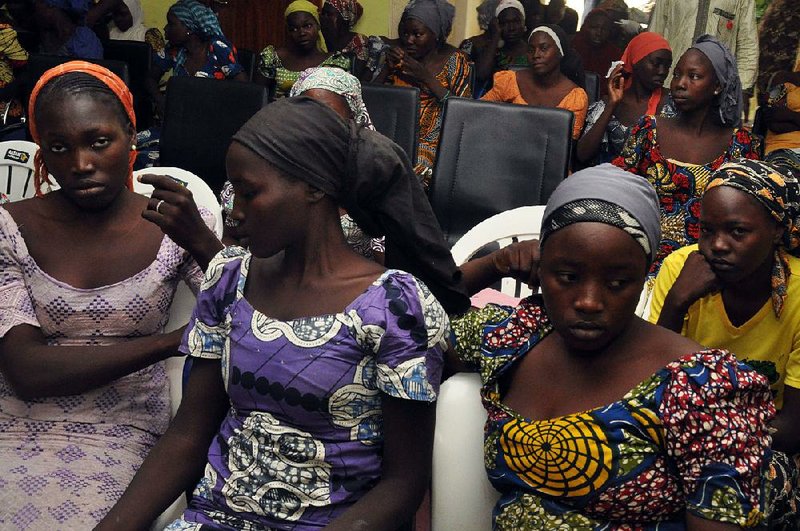ABUJA, Nigeria -- Nigerian President Muhammadu Buhari expressed joy at meeting Sunday with the 82 Chibok schoolgirls newly freed after being held captive for three years by Boko Haram Islamic extremists.
"We've always made it clear that we will do everything in our power to ensure the freedom & safe return of our daughters & of all [Boko Haram] captives," Buhari said on his Twitter account.
Photos tweeted by the president show dozens of the freed girls at Buhari's official residence.
"The president was delighted to receive them and he promised that all that is needed to be done to reintegrate them into the society will be done," said presidential spokesman Femi Adesina.
"He promised that the presidency will personally supervise their rehabilitation. He mentioned that they will continue with their education."
The schoolgirls will be reunited with their families soon, said the International Committee of the Red Cross, which helped negotiate the girls' release.
Shortly after meeting the freed schoolgirls, Buhari announced that he will be returning to London for medical treatment. Buhari was in Britain earlier this year for more than seven weeks for medical care. Buhari has missed three consecutive Cabinet meetings in Nigeria, prompting concerns for his health.
Other Nigerians, including some parents of the kidnapped girls, gathered in Abuja at the Unity Fountain to celebrate the weekend release.
Parents of the missing girls expressed anxiety over the fate of their daughters.
The Rev. Enoch Mark, whose two daughters have been missing, was still awaiting word Sunday if they were among those freed. He emphasized, though, that he considered all 82 of the girls to be his daughters "because most of them worship in my church."
"Three years is not three days," he said. "I have to be anxious with the intention to see if one of my daughters is among the released ones."
Some parents did not live long enough to see their daughters released. And the recovery process is expected to be a long one for the girls.
"They will face a long and difficult process to rebuild their lives after the indescribable horror and trauma they have suffered at the hands of Boko Haram," said Pernille Ironside, acting representative of UNICEF Nigeria.
Authorities say 113 schoolgirls remain missing from the group of 276 abducted from their boarding school in April 2014.
Girls who escaped early on said some of their classmates had died from illness. Others did not want to come home because they'd been radicalized by their captors, the girls said.
Human-rights advocates also fear some of the girls kidnapped from the Chibok boarding school have been used by Boko Haram to carry out suicide bombings.
A group of 21 Chibok girls was freed in October, and they have been in government care in Abuja for medical attention, trauma counseling and rehabilitation.
Human rights groups have criticized the decision to keep the girls in custody in Abuja, about 560 miles from Chibok.
It was not immediately clear whether the newly freed girls would join them.
They should be quickly released to their families and not be subjected to lengthy government detention, Amnesty International's Nigeria office said, adding that the girls don't deserve to be put through a "publicity stunt" and deserve privacy.
Five Boko Haram commanders were released in exchange for the freedom of 82 Chibok schoolgirls, a Nigerian government official said Sunday.
The confirmation of the prisoner swap came a day after the young women were liberated. The official spoke on condition of anonymity as he was not authorized to speak to reporters on the matter.
Neither the Nigerian president nor Boko Haram, which has links to the Islamic State extremist group, gave details on the exchange.
Negotiations for the girls' release were made more complicated by the splintering of the Islamist group into two factions, with each holding captives, Vice President Yemi Osinbajo said last month.
The mass abduction three years ago caused an international outcry and led to the #BringBackOurGirls social media campaign championed by then-first lady Michelle Obama. Boko Haram has carried out a violent campaign since 2009 to impose its version of Islamic rule in Africa's most populous country. Nigeria is almost evenly split between a mainly Muslim north and a predominantly Christian south.
Boko Haram's attacks have left tens of thousands of people dead and have spilled into Niger, Chad, and Cameroon.
Information for this article was contributed by Bashir Adigun, Haruna Umar and Sunday Alamba of The Associated Press; and by Dulue Mbachu of Bloomberg News.
A Section on 05/08/2017

